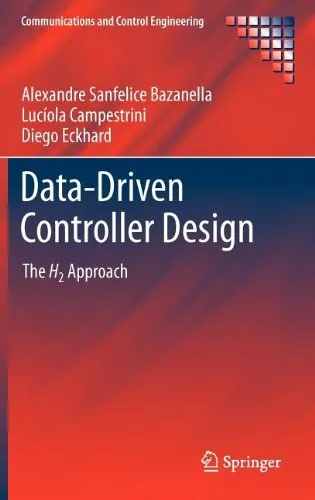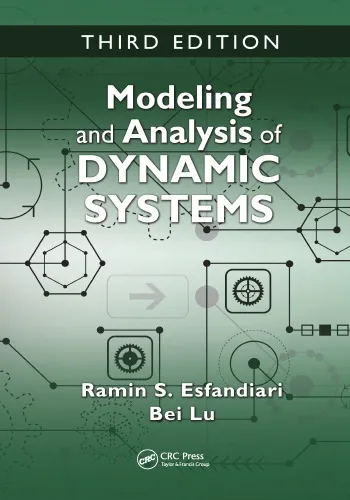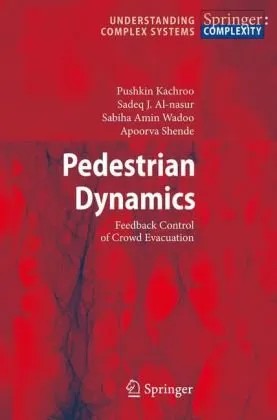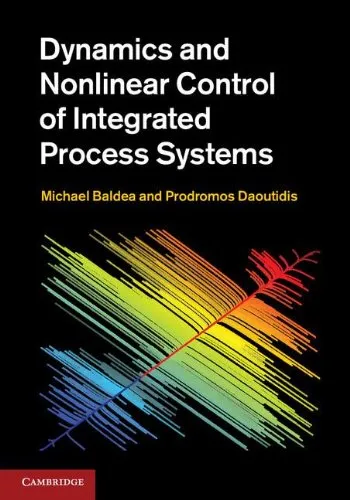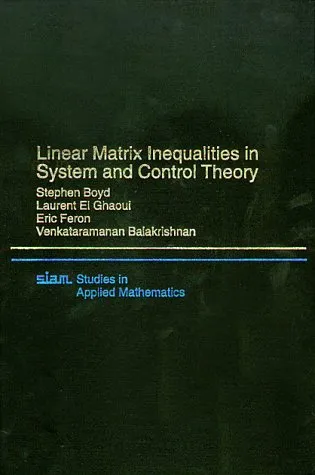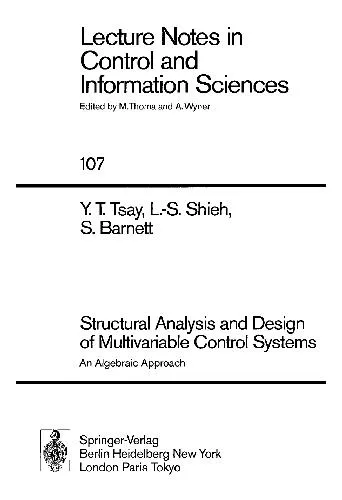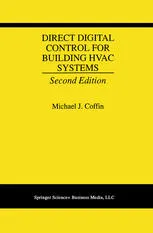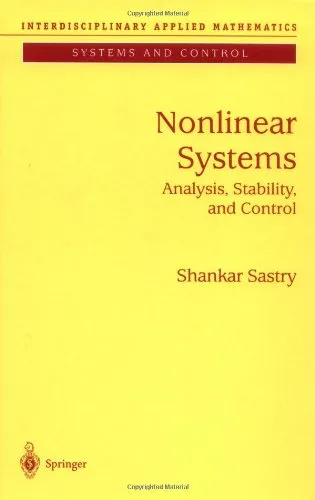Data-Driven Controller Design: The H2 Approach
4.0
بر اساس نظر کاربران

شما میتونید سوالاتتون در باره کتاب رو از هوش مصنوعیش بعد از ورود بپرسید
هر دانلود یا پرسش از هوش مصنوعی 2 امتیاز لازم دارد، برای بدست آوردن امتیاز رایگان، به صفحه ی راهنمای امتیازات سر بزنید و یک سری کار ارزشمند انجام بدینکتاب های مرتبط:
معرفی کتاب "Data-Driven Controller Design: The H2 Approach"
کتاب "Data-Driven Controller Design: The H2 Approach" اثری مفصل و علمی است که روشهای مدرن طراحی کنترلگر را از دیدگاه دادهمحور با تمرکز بر معیار H2 بررسی میکند. این کتاب بهطور خاص برای پژوهشگران، مهندسان و دانشجویانی که علاقهمند به طراحی کنترلگرهای عملی با استفاده از اطلاعات واقعی از سیستمهای دینامیکی هستند، نوشته شده است.
خلاصهای جامع از کتاب
در این کتاب نویسندگان ابتدا مفاهیم پایهای مربوط به کنترل سیستمها را معرفی میکنند و سپس اصول طراحی کنترلگرهای کلاسیک و مدرن را با تمرکز بر دادههای تجربی توضیح میدهند. تأکید اصلی کتاب بر روی معیار H2 است که از روشهای بهینهسازی برای طراحی کنترلگرهایی که عملکرد بهینهای در سیستم دارند بهره میبرد. برخلاف روشهای سنتی که نیازمند مدلسازی دقیقی از سیستم میباشند، رویکرد دادهمحور پیشنهادشده در این کتاب امکان طراحی کنترلگر را به شکلی فراهم میکند که مدل دقیق سیستم لزوماً در دسترس نباشد.
کتاب در فصول مختلف به ساختار و پارادایمهای مختلف روش دادهمحور میپردازد. یکی از نکات برجسته این کتاب استفاده از روشهای یادگیری ماشین و تحلیل داده برای بهبود عملکرد کنترلگرهاست. علاوه بر این، نویسندگان بهطور مفصل به کاربردهای عملی این روش در صنایع مختلف مانند خودروسازی، رباتیک و انرژی میپردازند. این موضوع به خوانندگان کمک میکند تا استفادههای کاربردی و علمی این تکنیکها را درک کنند.
نکات کلیدی
- رویکرد دادهمحور در طراحی کنترلگر با تأکید بر معیار H2 و مزایای استفاده از اطلاعات واقعی سیستم.
- مقایسه روشهای دادهمحور با روشهای مدلمحور سنتی.
- توضیح جزئیات و مراحل بهینهسازی کنترل سیستم با استفاده از دادهها.
- ارائه سناریوهای عملی از صنایع مختلف و نحوه پیادهسازی این روشها.
- بررسی استفاده از الگوریتمهای یادگیری ماشین در پروسه کنترل سیستمها.
جملات معروف از کتاب
“A data-driven approach uncovers valuable insights that traditional model-based methods often overlook.”
“The H2 criterion is not merely a mathematical construct; it is a bridge between theory and practice.”
“Learning from data is not just a trend, but an inevitable evolution in control system design.”
چرا این کتاب مهم است؟
با پیشرفت استفاده از دادهها در حوزههای گوناگون علوم و مهندسی، نیاز به روشهای مدرن و دادهمحور برای طراحی سیستمهای کنترل افزایش یافته است. کتاب "Data-Driven Controller Design: The H2 Approach" با استفاده از رویکرد علمی و کاربردی خود، این خلا را پر میکند. این کتاب میتواند به پژوهشگران کمک کند تا درک عمیقتری از کنترلگرهایی که بازدهی بالاتر و عملکرد بهینهتری دارند به دست آورند.
همچنین، مسائل و مثالهای عملی ارائهشده در کتاب به خوانندگان اجازه میدهد که این روشها را در دنیای واقعی به کار گیرند. از این رو، این اثر نه تنها به توسعه نظریات علمی کمک میکند، بلکه در زمینه کاربردهای عملی نیز نقش مهمی ایفا میکند. اگر به دنبال رویکردی نوین در طراحی کنترل سیستمها هستید، این کتاب یکی از منابع اساسی است که نباید از دست بدهید.
Introduction to "Data-Driven Controller Design: The H2 Approach"
Control system design is at the heart of modern engineering applications, ranging from aerospace to robotics, and from industrial automation to power systems. The process of designing a controller typically requires detailed knowledge of the system's dynamics, often obtained from mathematical models. However, what happens when such models are incomplete, noisy, or entirely unavailable? "Data-Driven Controller Design: The H2 Approach" addresses this challenge head-on by presenting a novel, practical methodology for developing data-driven controllers, empowering practitioners and researchers alike to achieve optimal control outcomes without relying heavily on theoretical models.
Detailed Summary of the Book
This book provides a comprehensive exploration of designing control systems directly from data, leveraging the H2 optimization framework. It bridges the gap between traditional model-based approaches and more modern, data-driven techniques, offering a clear pathway for engineers and researchers venturing into this emerging domain. By utilizing the H2 approach, the book emphasizes the minimization of the mean-square error between the system response and the desired performance, providing a mathematically rigorous yet practical solution for real-world scenarios.
The book lays its foundation by revisiting core control theory concepts, ensuring that readers have all the necessary tools to understand and apply the H2 approach. It then progresses to data-driven methods, emphasizing the importance of extracting meaningful information from available data to design high-performance controllers. Readers will discover various strategies for data collection, identification, and validation, as well as an in-depth discussion of H2 optimal control tailored for data-driven applications.
One of the standout features of the book is its focus on practical implementation. The authors provide step-by-step algorithms, explained in clear detail, alongside examples drawn from industrial and academic settings. Whether you're a seasoned control engineer or a newcomer to the field, you'll find valuable insights, practical tools, and a systematic approach to solve real-world problems using this comprehensive guide.
Key Takeaways
- A thorough understanding of the H2 control framework and its applications in both classical and data-driven contexts.
- Step-by-step guidance on designing controllers directly from experimental data, even in the absence of complete system models.
- Practical algorithms and methodologies, explained with clarity, that enable optimal control design in real-world scenarios.
- Bridging the gap between theoretical concepts and real-world implementation, offering actionable insights for researchers and practitioners alike.
- Insights into overcoming challenges associated with noisy data, incomplete models, and other practical complexities.
Famous Quotes from the Book
"The bridge between theory and practice in control design is made of data; it is only by walking across this bridge that we can truly build effective, real-world systems."
"In the absence of perfect models, data is not just a substitute—it is the sole representation of reality available to the engineer."
"Control design is no longer confined to theoretical equations; it now thrives at the intersection of data, computation, and optimization."
Why This Book Matters
The field of control engineering is undergoing a paradigm shift, driven by advances in data science, machine learning, and computational power. Traditional model-based approaches, while still valuable, are increasingly supplemented by data-driven techniques that better address the complexities of real-world systems. "Data-Driven Controller Design: The H2 Approach" matters because it provides a practical and rigorous framework for embracing this transformation. It demystifies the process of designing controllers from data, offering readers the tools and confidence they need to tackle challenging engineering problems.
Furthermore, the book emphasizes both the theoretical foundations and practical applications of the H2 approach, making it a valuable resource for academic researchers and industry professionals. Its real-world examples, meticulous algorithms, and actionable insights make it a must-read for anyone looking to stay ahead in the rapidly evolving field of control systems.
Whether you're working on advanced robotics, sustainable energy systems, or cutting-edge industrial automation, this book equips you with the skills and knowledge to design effective, optimized controllers from data—not just models. By understanding and leveraging the H2 approach, readers will be well-positioned to lead innovation in control design in an increasingly data-centric world.
دانلود رایگان مستقیم
شما میتونید سوالاتتون در باره کتاب رو از هوش مصنوعیش بعد از ورود بپرسید
دسترسی به کتابها از طریق پلتفرمهای قانونی و کتابخانههای عمومی نه تنها از حقوق نویسندگان و ناشران حمایت میکند، بلکه به پایداری فرهنگ کتابخوانی نیز کمک میرساند. پیش از دانلود، لحظهای به بررسی این گزینهها فکر کنید.
این کتاب رو در پلتفرم های دیگه ببینید
WorldCat به شما کمک میکنه تا کتاب ها رو در کتابخانه های سراسر دنیا پیدا کنید
امتیازها، نظرات تخصصی و صحبت ها درباره کتاب را در Goodreads ببینید
کتابهای کمیاب یا دست دوم را در AbeBooks پیدا کنید و بخرید
1306
بازدید4.0
امتیاز0
نظر98%
رضایتنظرات:
4.0
بر اساس 0 نظر کاربران
Questions & Answers
Ask questions about this book or help others by answering
No questions yet. Be the first to ask!
